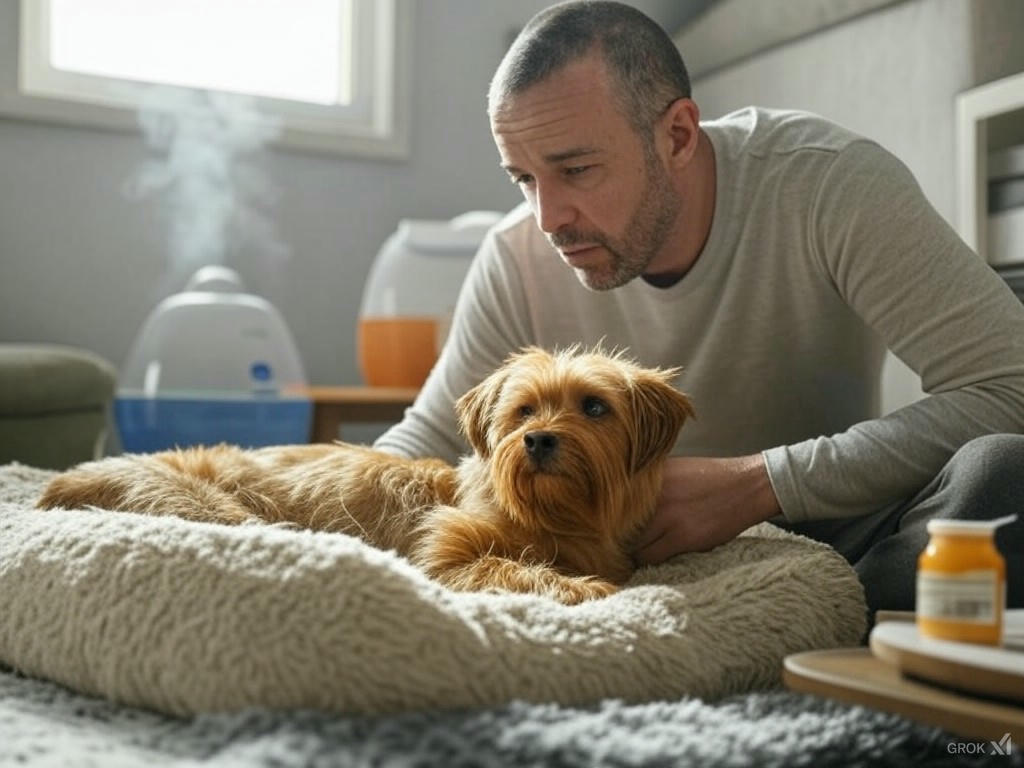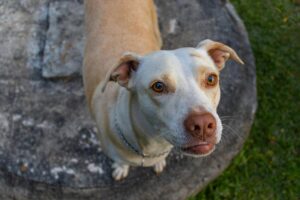Table of Contents
Why Is Your Dog Coughing? Common Causes & Soothing Home Remedies
Introduction
That sudden honk or gag from your dog isn’t just annoying—it’s a red flag. Last month, a client dismissed her Cocker Spaniel’s cough as “just a cold.” Three days later, I diagnosed pneumonia—a delay that cost $1,200 in hospitalization. Another patient, a senior Pug with a “harmless” cough, was actually in heart failure.
As a veterinarian with over 8 years of experience in small animal medicine, I’ve seen all types of coughs—from harmless kennel cough picked up at the groomer to life-threatening heart-related conditions. And the truth is, a dog’s cough isn’t one-size-fits-all.
There are many reasons why dogs cough. It could be as simple as inhaling a bit of dust, or as complex as a parasitic infection or heart disease. Understanding the underlying cause is key to knowing when to act and how to help your furry friend feel better.
In this guide, I’ll walk you through:
- The most common causes of coughing in dogs (including infectious, inflammatory, and heart-related issues)
- Emergency signs you should never ignore
- Gentle home remedies that may help relieve mild coughs
- And what to expect when you visit the vet for answers
While home support can help in some mild cases, a persistent or severe cough always calls for a vet’s evaluation. A 2023 report by the American Veterinary Medical Association (AVMA) emphasizes the importance of early diagnosis to prevent complications, especially in vulnerable dogs like puppies or seniors.
So, let’s dive in and give you the tools to confidently care for your coughing canine—whether it’s just a little throat tickle or something more serious.

Why is My Dog Coughing? Exploring Common Causes
🐶 What a Cough Means in Dogs
A cough is the body’s natural reflex to clear the airways. Just like in people, your dog might cough to remove mucus, irritants, or even a foreign object. But unlike humans, dogs can’t tell us what’s wrong—so the sound, frequency, and any other symptoms become important clues.
Not all coughs are dangerous, but some can signal more serious conditions that need prompt treatment. Let’s break down the most common causes behind canine coughing.
🦠 Infectious Causes (The “Catchy” Coughs)
These are conditions that can spread easily between dogs, especially in places like kennels, dog parks, and grooming salons.
Kennel Cough (Canine Infectious Respiratory Disease Complex – CIRDC)
- What it is: Kennel cough is a broad term for contagious bronchitis in dogs, often caused by a mix of viruses and bacteria like Bordetella bronchiseptica.
- What you might hear: A dry, honking cough—many owners say it sounds like a goose honk. Dogs may also gag afterward.
- Other signs: Dogs typically stay active and eat normally unless complications develop.
- What to know: It’s very contagious but usually mild. Still, puppies, seniors, and immune-compromised dogs are at risk of pneumonia. A kennel cough vaccine can reduce severity but doesn’t prevent all strains.
Canine Influenza (Dog Flu)
- What it is: A respiratory illness caused by the H3N8 and H3N2 influenza viruses.
- What you might hear: A moist, wet cough that may be accompanied by nasal discharge, fever, or lethargy.
- Other signs: Loss of appetite and sneezing.
- What to know: Spread via droplets and surfaces. Dogs who frequent social settings are more at risk. Vaccines are available and may be recommended for at-risk pets.
Parasitic Infections (Heartworm & Lungworm)
- What it is: Heartworms live in the heart and lungs, while lungworms inhabit lung tissue.
- What you might hear: Chronic coughing, especially with exercise intolerance.
- Other signs: Lethargy, weight loss, or collapse in severe cases.
- What to know: These are serious and potentially fatal without treatment. Heartworm prevention is essential and widely recommended by vets, especially in endemic areas.
🫁 Structural or Inflammatory Issues
Tracheal Collapse
- What it is: Common in small breeds like Yorkies and Chihuahuas, this condition happens when the tracheal rings lose rigidity and collapse inward.
- What you might hear: A goose-like honking cough triggered by excitement, pulling on the collar, or even eating.
- What to know: It’s a chronic condition but can often be managed with medication, weight control, and switching to a harness.
Chronic Bronchitis
- What it is: Inflammation of the lower airways causing persistent coughing and excess mucus.
- What you might hear: A deep, harsh cough that may produce phlegm.
- What to know: More common in middle-aged to older dogs. Requires long-term management with anti-inflammatory meds, cough suppressants, and sometimes bronchodilators.
❤️ Heart-Related Coughs
Congestive Heart Failure (CHF)
- What it is: In diseases like Myxomatous Mitral Valve Disease (MMVD), the heart becomes enlarged and may push against airways or cause fluid buildup in the lungs.
- What you might hear: A soft, moist cough often worse at night or after lying down.
- Other signs: Exercise intolerance, labored breathing, or fainting.
- What to know: CHF is serious and requires lifelong medical management. Diagnosis typically includes chest X-rays and echocardiograms.
Other Potential Causes of Coughing
- Allergies: Just like people, dogs can react to dust, pollen, or mold with coughing or sneezing.
- Irritants: Smoke, cleaning sprays, or strong fragrances may trigger coughing spells.
- Foreign Objects: Dogs may inhale small objects like grass awns or food, leading to sudden, violent coughing.
- Pneumonia: Inflammation of the lungs can be infectious or caused by aspiration.
Cancer: Masses in the chest or lungs can press on airways and cause coughing, especially in older dogs.your veterinarian for any persistent or concerning cough.

Emergency Signs & Soothing Your Dog’s Cough at Home
Some dog coughs are harmless and pass quickly—but others are red flags for something far more serious. As a veterinarian, I always tell my clients: If your gut says something’s wrong, trust it. It’s better to be cautious than to miss a time-sensitive emergency.
Here are the signs that mean you should stop reading and contact your vet (or an emergency animal hospital) immediately:
🚨 Critical Emergency Signs in a Coughing Dog
1. Difficulty Breathing
- What it looks like: Rapid, shallow breathing, open-mouth breathing when not hot, or stretching the neck out to inhale.
- Why it’s serious: This suggests your dog isn’t getting enough oxygen—a life-threatening situation.
2. Blue, Gray, or Pale Gums/Tongue
- How to check: Gently lift your dog’s lip and look at the gums. Healthy gums should be pink.
- Why it’s serious: Abnormal color means the body isn’t oxygenating properly and could indicate respiratory failure.
3. Nonstop Coughing Without Rest
- What it looks like: Your dog is coughing so frequently they can’t sleep, eat, or settle down.
- Why it’s serious: This could point to airway obstruction, severe irritation, or progressing disease.
4. Coughing Up Blood
- Even small amounts are urgent. This can indicate bleeding in the lungs or throat, trauma, infection, or even cancer.
5. Collapse or Extreme Lethargy
- What it looks like: Your dog suddenly falls, appears weak, or can barely lift their head.
- Why it’s serious: This can signal severe cardiovascular or respiratory collapse.
6. High Fever or Heat Intolerance
- If your dog feels very warm, is lethargic, and has a deep cough, it could be an infection or pneumonia. (A normal dog temperature ranges between 100.5–102.5°F or 38–39.2°C.)
7. Known Heart Condition + New/Worsening Cough
- A change in frequency, sound, or severity of a cough in a dog with diagnosed heart disease should be treated as a potential emergency.
💡 Pro Tip: If possible, record a short video of your dog coughing or struggling to breathe. It can be extremely helpful for your vet’s evaluation.
According to the American College of Veterinary Emergency and Critical Care (ACVECC), respiratory distress is one of the top 10 reasons for emergency visits—and a fast response can save lives.
If you see any of these signs, stop reading and contact your vet or an emergency animal hospital immediately.

Soothing a Mild Dog Cough at Home
If your dog’s cough is mild, occasional, and they’re otherwise eating, drinking, and behaving normally—with no emergency signs—you may be able to offer a bit of comfort at home.
These remedies won’t “cure” the problem but can soothe irritated airways while you monitor symptoms or wait for a vet appointment.
🏠 Comfort Measures for Mild Coughs
✅ 1. Encourage Rest & Relaxation
- Why it helps: Just like humans, dogs recover best when they’re calm and not overexerting themselves.
- What to do: Avoid vigorous exercise, limit play, and let your dog nap in a quiet, cozy spot.
✅ 2. Steam Therapy (Bathroom Trick)
- How to do it: Bring your dog into the bathroom, close the door, and run a hot shower for 10–15 minutes. Let them inhale the steamy air (but not the water).
- Why it helps: Moisture soothes irritated airways and loosens mucus.
- How often: 2–3 times a day for a few days can help in mild cases.
✅ 3. Use a Cool-Mist Humidifier
- Place it near where your dog sleeps.
- Important: Keep it clean to prevent mold and bacteria growth.
- Why it helps: Dry air—especially in winter or air-conditioned homes—can worsen coughing.
✅ 4. Offer a Small Amount of Honey
- Type: Use plain, raw honey (no additives or xylitol).
- Dosage:
- Small dogs: ¼ tsp
- Medium dogs: ½ tsp
- Large dogs: 1 tsp
- Up to 3 times per day
- When to avoid: Don’t give honey to puppies under 1 year or diabetic dogs without vet approval.
- Why it helps: It coats the throat and may reduce irritation.
✅ 5. Switch to a Harness
- Collars can trigger coughing, especially in small breeds prone to tracheal collapse.
- Use a well-fitted harness that clips at the back to avoid pressure on the throat.
✅ 6. Eliminate Irritants
- Avoid:
- Cigarette smoke
- Vaping aerosols
- Air fresheners or perfumes
- Cleaning products
- Dusty or moldy environments
- Why it matters: These can worsen inflammation in your dog’s airways.
✅ 7. Ensure Hydration & Wet Food
- Encourage water intake to keep mucus thin.
- Offer wet food or soaked kibble if your dog is reluctant to eat dry food while coughing.
⚠️ Important Cautions
- Never give your dog human cough medicine unless your vet specifically approves it. Many contain ingredients that are toxic to pets.
- Don’t ignore a cough that lasts longer than 3–5 days, worsens, or is accompanied by other symptoms.
- These home strategies are for supportive care only. If your dog’s cough continues or changes, call your vet.
📌 According to VCA Animal Hospitals, even mild coughs can be early signs of underlying illness. Early intervention prevents complications.
What to Expect at the Veterinarian’s Office
So, you’ve decided (rightly!) to take your coughing dog to the veterinarian. Knowing what to expect can make the visit less stressful for both you and your pet. The goal of the visit is to figure out the why behind the cough so the right treatment can begin. Here’s a typical process:
1. Talking About Your Dog’s History (The “Interview”)
Your vet will ask you a lot of questions to get clues about the cause. Be prepared to share details like:
- When did the cough start?
- What does it sound like? (Dry, honking, wet, gagging?) Tip: Try to capture a short video of your dog coughing on your phone beforehand – it can be incredibly helpful!
- When does it happen most? (At night, after exercise, when excited, after eating/drinking?)
- Is anything coming up? (Phlegm, foam?)
- Are there any other symptoms? (Lethargy, fever, runny nose/eyes, loss of appetite, changes in breathing?)
- Your dog’s vaccination history? (Especially Bordetella/kennel cough vaccine).
- Recent activities? (Boarding, grooming, dog parks, travel?)
- Any current medications or supplements?
- Any pre-existing health conditions? (Like known heart issues).
The more information you provide, the better your vet can narrow down the possibilities.
2. The Physical Examination
Your veterinarian will perform a thorough hands-on check:
- Listening Carefully: Using a stethoscope to listen to your dog’s heart and lungs is crucial. They’ll listen for abnormal sounds like crackles, wheezes, or heart murmurs.
- Taking Temperature: To check for fever, a sign of infection or inflammation.
- Checking Gums: Assessing color (for oxygen levels) and hydration.
- Feeling the Throat/Neck: Gently checking for sensitivity or abnormalities in the trachea (windpipe).
- Overall Assessment: Observing breathing effort, energy level, and general condition.
3. Diagnostic Tests (If Needed)
Sometimes, the history and physical exam provide enough information, especially for straightforward cases like suspected kennel cough. Often, however, your vet may recommend tests to get a clearer picture:
- Chest X-rays (Radiographs): Very common for coughs. These images help visualize the lungs, airways (like the trachea), and the size and shape of the heart. They can show signs of bronchitis, pneumonia, tracheal collapse, heart enlargement, or masses.
- Blood Work: Can reveal signs of infection, inflammation, or issues with organ function that might relate to the cough. A specific test for heartworm disease might also be run.
- Infectious Disease Testing: Swabs from the nose or throat can sometimes be tested for specific viruses or bacteria (like those causing kennel cough or canine influenza).
- Advanced Diagnostics (Less Common): For persistent or complex cases, your vet might discuss:
- Fluoroscopy: A “moving X-ray” useful for diagnosing tracheal collapse as it happens.
- Echocardiogram: An ultrasound of the heart to assess its structure and function if heart disease is suspected.
- Bronchoscopy: Inserting a tiny camera into the airways (under anesthesia) to look directly inside and collect samples. Usually done by specialists.
Your vet will explain why they recommend specific tests and what information they hope to gain.
4. Diagnosis and Treatment Plan
Based on all the information gathered, your vet will discuss a likely diagnosis (or potential causes if it’s not yet certain) and propose a treatment plan. This might involve:
- Medications (like cough suppressants, antibiotics, anti-inflammatories, heart medications).
- Management recommendations (rest, harness use, avoiding irritants).
- Follow-up appointments to monitor progress.
Your Role as Pet Parent
Don’t hesitate to ask questions! Make sure you understand the diagnosis (or possibilities), the treatment plan, how to give medications, and what signs to watch for (both improvement and worsening). Working closely with your veterinarian gives your dog the best chance for a speedy recovery.
Does Breed Matter? Cough Considerations for Specific Dogs
While any dog can develop a cough, some breeds are more likely to experience specific respiratory or cardiac issues due to their anatomy, size, or genetic background. Knowing your dog’s breed tendencies can help you spot early signs and seek help sooner.That said, breed is just one piece of the puzzle—individual health, weight, lifestyle, and age all play a role too.
Here are a few examples:

1. Toy Breeds (e.g., Yorkshire Terriers, Pomeranians, Chihuahuas, Shih Tzus, Toy Poodles)
Common Issue: Tracheal Collapse
- These small breeds often have delicate tracheas that can weaken and collapse with time.
- Signs to watch: A dry, honking cough that worsens when excited, eating, or when pressure is applied to the neck.
Helpful Tips:
- Use a harness instead of a collar.
- Maintain a healthy weight.
- Avoid smoke, dust, and other airway irritants.
Limit overexcitement, which can trigger a coughing episode.
2. Brachycephalic (Flat-Faced) Breeds (e.g., Pugs, Bulldogs, French Bulldogs, Boxers, Shih Tzus)
- Common Concern: Brachycephalic Obstructive Airway Syndrome (BOAS). Their unique facial structure often includes narrowed nostrils, a long soft palate, and other changes that can obstruct airflow.
- What to Watch For: While known for snorting and snoring, inflammation or other issues can lead to gagging, coughing, and significant breathing difficulty. They are also more sensitive to heat.
- Key Management Tips (Discuss with your vet):
- Weight Control: Crucial for keeping airways as open as possible.
- Avoid Heat & Strenuous Exercise: These breeds can overheat easily, leading to respiratory distress. Exercise moderately in cool weather.
- Use a Harness: Avoid any pressure on the neck.
- Veterinary Consultation: Vets familiar with BOAS can advise on management and potential surgical options if needed.
3. Large and Giant Breeds (e.g., Great Danes, Doberman Pinschers, Irish Wolfhounds, Newfoundlands, Labrador Retrievers)
- Common Concerns: While tracheal collapse is rare, these breeds can be more prone to:
- Heart Conditions: Such as Dilated Cardiomyopathy (DCM), where the heart muscle weakens and the heart enlarges, potentially leading to coughing due to pressure on airways or fluid in the lungs.
- Laryngeal Paralysis: A condition affecting the voice box (larynx), more common in older large breeds (especially Labs), causing noisy breathing, voice changes, and sometimes coughing or gagging, particularly after exertion or eating.
- Key Management Tips (Discuss with your vet):
- Regular Vet Check-ups: Especially important as they age, including careful listening to the heart and lungs. Cardiac evaluations might be recommended.
- Monitor Exercise Tolerance: Report any increased tiredness or reluctance to exercise to your vet, especially if accompanied by coughing.
Even if your dog fits one of these “at-risk” categories, they may never develop a cough. And even if they don’t belong to these breeds, they still could.
That’s why regular wellness checks and knowing your dog’s baseline behavior are crucial. According to Cornell University’s College of Veterinary Medicine, breed-related respiratory risks should always be balanced with individual assessment and lifestyle factors.
Conclusion: Partnering with Your Vet for Your Dog’s Health
Hearing your dog cough can be worrying—but as we’ve seen, not every cough is a crisis. The key lies in knowing when to watch, when to comfort, and when to call the vet.
Let’s recap the essentials:
✅ What You’ve Learned
- Dog coughs have many causes—from mild kennel cough and allergies to serious heart or lung disease.
- Emergency signs like labored breathing, blue gums, or coughing up blood require immediate veterinary care.
- Home comfort strategies like steam therapy, using a harness, and offering honey (when safe) can help soothe mild coughs.
- Veterinary visits may include a physical exam, chest X-rays, bloodwork, or infectious disease testing to find the cause.
- Breed matters, but it’s just one piece of the puzzle—your dog’s age, weight, lifestyle, and environment all contribute to their risk.
👩⚕️ Your Role as a Pet Parent
Stay observant. Track symptoms. Don’t wait too long to act. And always trust your gut—if something feels off, get it checked.
Whether it’s a minor irritant or a deeper issue like tracheal collapse or heart disease, the best way to help your dog is by working hand-in-paw with your veterinarian to create the right treatment and management plan.
Your dog depends on you—and with the right care, most cough-related conditions can be treated or managed effectively, bringing your pup relief and giving you peace of mind.sis is the best way to ensure your furry friend gets back to their happy, healthy self as soon as possible.
FAQs
1. Why is my dog coughing but otherwise acting normal?
Mild infections like kennel cough often cause coughing without affecting energy. Still, a vet check is important to rule out hidden issues.
2. When should I worry about my dog’s cough?
Seek urgent veterinary care if your dog has trouble breathing, coughs up blood, or shows signs of weakness or pale gums.
3. Can I give my dog human cough medicine?
No, many human cough medications are unsafe for dogs. Always consult your veterinarian before giving any treatments.
4. How can I soothe my dog’s mild cough at home?
Provide rest, use a humidifier or steam therapy, and avoid irritants like smoke; a little honey may help if safe for your dog.
5. Can kennel cough go away on its own?
Mild cases of kennel cough often resolve within 1–2 weeks, but veterinary advice ensures it doesn’t progress to something more serious.




